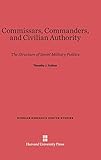Commissars, Commanders, and Civilian Authority : The Structure of Soviet Military Politics / Timothy J. Colton.
Material type: TextSeries: Russian Research Center Studies ; 79Publisher: Cambridge, MA : Harvard University Press, [2013]Copyright date: ©1979Edition: Reprint 2014Description: 1 online resource (365 p.) : illustratedContent type:
TextSeries: Russian Research Center Studies ; 79Publisher: Cambridge, MA : Harvard University Press, [2013]Copyright date: ©1979Edition: Reprint 2014Description: 1 online resource (365 p.) : illustratedContent type: - 9780674497429
- 9780674497443
- 322/.5/0947
- JN6520.C58
- online - DeGruyter
| Item type | Current library | Call number | URL | Status | Notes | Barcode | |
|---|---|---|---|---|---|---|---|
 eBook
eBook
|
Biblioteca "Angelicum" Pont. Univ. S.Tommaso d'Aquino Nuvola online | online - DeGruyter (Browse shelf(Opens below)) | Online access | Not for loan (Accesso limitato) | Accesso per gli utenti autorizzati / Access for authorized users | (dgr)9780674497443 |
Browsing Biblioteca "Angelicum" Pont. Univ. S.Tommaso d'Aquino shelves, Shelving location: Nuvola online Close shelf browser (Hides shelf browser)

|

|

|

|

|

|

|
||
| online - DeGruyter Existentialism : A Theory of Man / | online - DeGruyter A Survey of the Roads of the United States of America, 1789 / | online - DeGruyter Selections from Latin Prose and Poetry : An Introduction to Roman Literature / | online - DeGruyter Commissars, Commanders, and Civilian Authority : The Structure of Soviet Military Politics / | online - DeGruyter Carlyle and Emerson : Their Long Debate / | online - DeGruyter The Economics of New England : Case Study of an Older Area / | online - DeGruyter The Market for College Graduates : And Related Aspects of Education and Income / |
Frontmatter -- Contents -- Introduction -- Part One. The Military Party Organs -- 1 The Structure of the Military Party Organs -- 2 The Roles of the Military Party Organs -- 3 The Military Party Organs in Military Administration -- 4 The Monitoring Capability of the Military Party Organs -- Part Two. The Military Party Organs and Military Politics -- 5 Routine Administrative Politics -- 6 The Great Purge -- 7 World War II Decision Making -- 8 The Zhukov Affair -- 9 Public Demand Articulations -- Part Three. Army-Party Relations Reassessed -- 10 The Army in Soviet Politics: Capabilities and Participation -- 11 Explaining the Army's Political Quiescence -- 12 Civil-Military Relations and Soviet Development -- Appendixes, Notes, Index -- Appendix A Biographical Data on Soviet Military Officers -- Appendix Β A Note on Primary Sources -- Notes -- Index -- Russian Research Center Studies
restricted access online access with authorization star
http://purl.org/coar/access_right/c_16ec
For six decade the Soviet system has been immune to military rebellion and takeover, which often characterizes modernizing countries. How can we explain the stability of Soviet military politics, asks Timothy Colton in his compelling interpretation of civil-military relations in the Soviet Union. Hitherto most western scholars have posited a basic dichotomy of interests between the Soviet army and the Communist party. They view the two institutions as conflictprone, with civilian supremacy depending primarily upon the party's control of officers through its organs within the military establishment. Colton challenges this thesis and argues that the military party organs have come to possess few of the attributes of an effective controlling device, and that the commissars and their heirs have operated as allies rather than adversaries of the military commanders. In explaining the extraordinary stability in army-party relations in terms of overlapping interests rather than controlling mechanisms, Colton offers a major case study and a new model to students of comparative military politics.
Mode of access: Internet via World Wide Web.
In English.
Description based on online resource; title from PDF title page (publisher's Web site, viewed 29. Nov 2021)


